Woman Wants To Let Her Mom Know She Can't Look After Her Untrained Dog Anymore, Seeks A Second Opinion
One of the fastest ways to upset friends and alienate people is to bring an untrained dog into a crowd. It's never too early or too late to start training your dog and correcting undesirable habits or behaviors.
Some of these may only be small irritants, like barking or having accidents in the house. However, any form of hostility calls for a quick response.
The majority of untrained dogs exhibit at least one risky behavior, such as running away, consuming objects they shouldn't, or starting fights with other dogs. A dog can escape, consume something harmful, or get into an unwinnable fight in a matter of seconds.
So, no matter the circumstances or the maturity level of your dog, professional dog training can be helpful. The OP of today's story had to face her mom's untrained dog, which barks, jumps, escapes, and snatches food—none of which are ideal but not necessarily deal-breakers.
OP's mom is incredibly protective of her dog and becomes very worried about sending her to a dog minder. Consequently, the OP has been working odd days, but the dog disturbs her whenever she works from home.
The dog barks continuously every time she hears a noise and won’t stop. The OP is fed up and wants to tell her mom that she can’t look after the dog anymore, but she's skeptical about doing so.
Here's the story's headline

OP's mum helps out with her son a lot as she looks after him one day a week

The dog would bark continuously every time she heard a noise and doesn’t stop
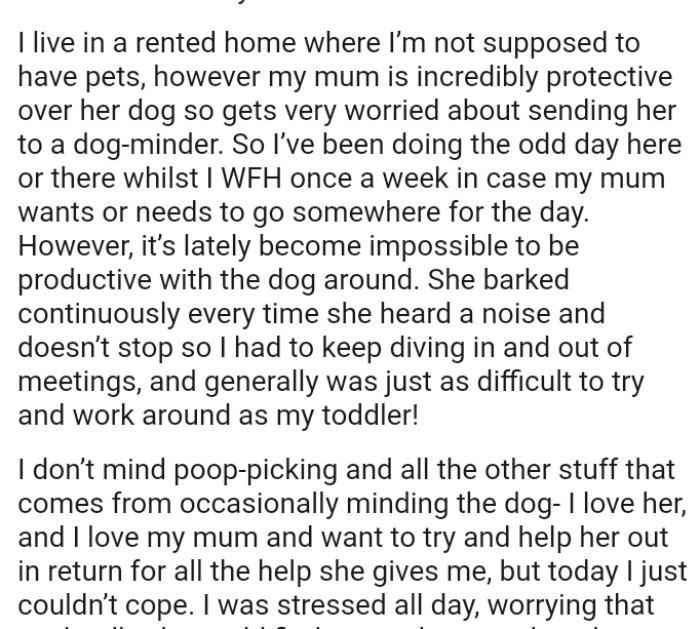
The Importance of Setting Boundaries
According to Dr. Brené Brown, a research professor at the University of Houston, setting healthy boundaries is crucial for maintaining relationships that are both respectful and nurturing.
Brown's work emphasizes that boundaries are not about shutting people out, but rather about protecting our own emotional resources and energy.
In this case, the woman is recognizing her limits, which is a vital step toward self-care.
Research supports the idea that when individuals acknowledge their capacity to manage responsibilities, they can maintain healthier relationships overall.
OP wants to tell her that she can’t look after the dog anymore, especially since she helps her and her kid
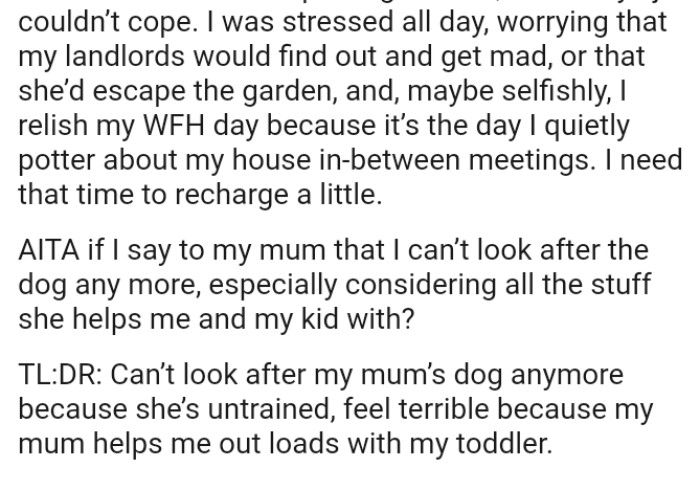
OP has offered the following explanation for why they think they might be the a-hole:
I worry that I might be the asshole because I can’t look after my mum’s dog anymore, even when she helps me out so much with my little one.
The dog is distracting the OP from work and she fears the neighbors will hear it

Throwing in a mention about her being worried about having a dog in her home

Psychologists specializing in family dynamics suggest that open communication is essential when addressing issues related to caregiving responsibilities.
Studies show that families who practice transparent dialogues are often more resilient and adaptive during times of stress.
Encouraging the woman to express her needs clearly to her mother may foster a more supportive environment and potentially lead to collaborative solutions.
This Redditor would understand it if the dog was trained
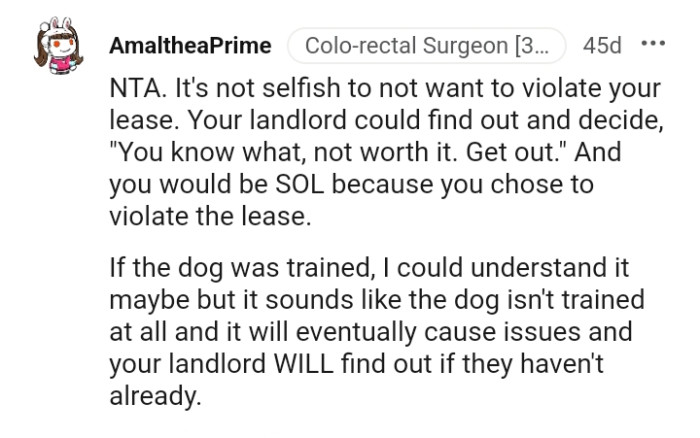
This Redditor hopes the OP's mom would be understanding about the whole thing

This is not an issue about the OP being selfish but the dog causing problems
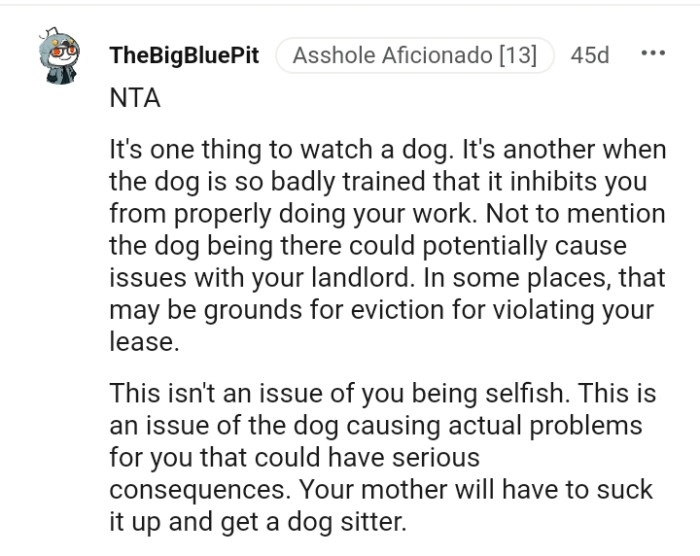
Psychological Impacts of Caregiving Stress
Research indicates that caregiving can lead to significant emotional and physical strain, often referred to as caregiver burnout.
According to the American Psychological Association, this phenomenon is characterized by exhaustion, increased irritability, and a decline in mental health.
Understanding that these feelings are common can help the woman feel validated and supported in her decision to step back from her duties.
It would be easier on the OP if her mom didn't burden her with the dog
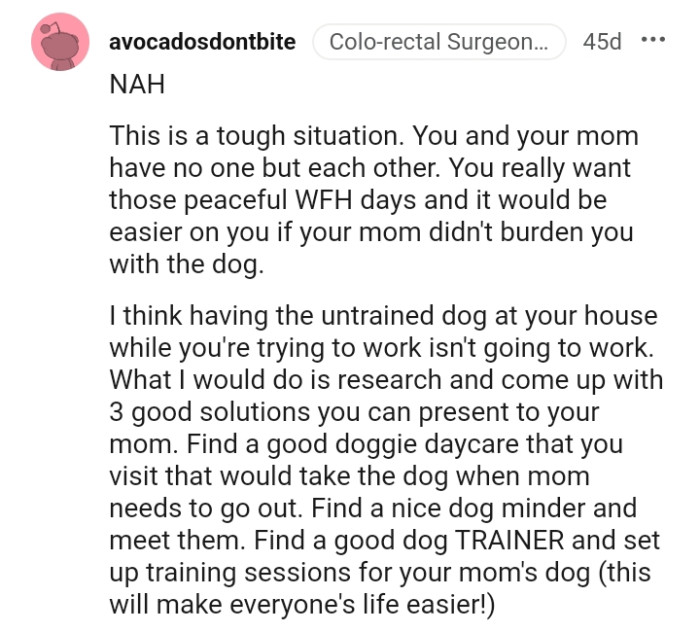
The OP wouldn't benefit from her work-from-home day

Has the OP brought up training classes to her mom?
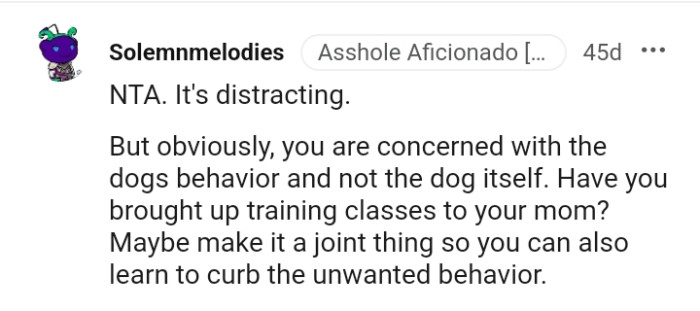
One practical approach to managing the stress of caregiving is utilizing mindfulness techniques, which have been shown to reduce anxiety and improve emotional regulation.
Dr. Jon Kabat-Zinn, a pioneer in the field of mindfulness, has conducted extensive research demonstrating its effectiveness in promoting mental well-being.
Incorporating brief mindfulness exercises into her daily routine may help the woman recharge emotionally while navigating this challenging situation.
Some dog owners make the error of delaying dog training because they believe they can adequately manage their dog's behavior as time goes on. This is a mistake, though, as delaying it would put their dog in more danger.
Redditors have given the OP their own pieces of advice, and you too can drop yours in the comments section below. Don't forget to share this post with your family and friends as well.
The Role of Emotional Self-Care
Emotional self-care is often overlooked but is crucial for anyone in a caregiving role.
Studies in clinical psychology emphasize that taking time for oneself can enhance one’s capacity to care for others.
Engaging in activities that promote personal joy and relaxation can replenish energy levels, making it easier to support loved ones.
Psychological Analysis
It sounds like the woman in the article is grappling with a classic case of caregiver burnout, which is completely understandable. When we take on responsibilities that exceed our emotional and physical limits, it can lead to exhaustion and resentment—especially if we feel guilty for wanting to prioritize our own needs. Open communication with her mom about her struggles could not only relieve some of that burden but also foster a more supportive relationship moving forward.
Analysis generated by AI
Analysis & Alternative Approaches
Ultimately, balancing personal needs with caregiving responsibilities is essential for long-term well-being.
Dr. Judith Orloff's work highlights that self-care is not a luxury but a necessity for those in nurturing roles.
By prioritizing her own emotional health, the woman can create a more sustainable caregiving environment.



